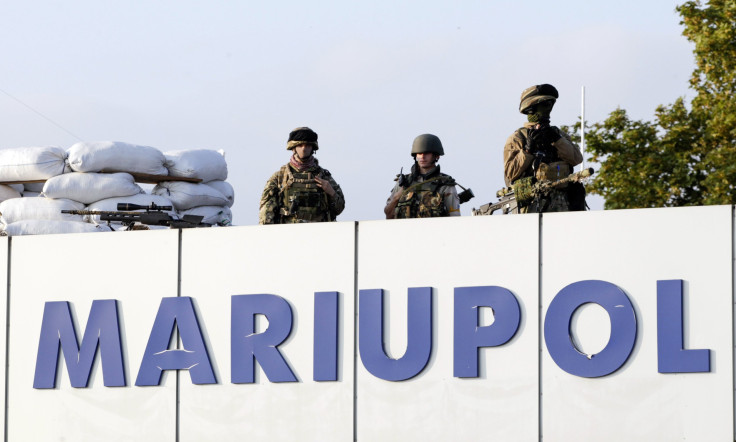Ukrainians In Mariupol Prepare For War As Poroshenko Says Cease-Fire Is Breached

MARIUPOL, Ukraine -- As the cease-fire reached Friday in eastern Ukraine shows signs of crumbling across the region, people in Mariupol, a port city on the Black Sea under assault by pro-Russian separatists, are preparing for a war that many here say is coming despite the current air of normalcy.
On the surface, much of the city seems to be running as usual, with cars driving on the streets, pedestrians on the sidewalks, children in playgrounds and even weddings held over the weekend.
But people are preparing for the advance of the rebels, whom the regular Ukrainian army and battalions of irregular volunteers have been unable to stop elsewhere in the country’s east.
A 43-year-old man named Aleksander, who declined to give his last name, is among the people getting ready for war. While many in the region have fled, he said he and his wife were staying put. They've got their basement equipped as shelter from shelling for themselves and their two children, stockpiling matches, candles, potatoes, canned goods and winter clothes.
Those goods are becoming harder and harder to get in Mariupol. Every day, there are long lines at bakeries. Some shops are closed, including one-third of the stores in the city’s largest mall. Automated bank machines are still dispensing cash, but people fear the money will run out soon. And in any case, wages have been delayed, so many do not have money to spend.
A clerk at a convenience store in the eastern end of the city said the bread put out in the morning is gone by noon. Many of those who plan to remain in Mariupol are the elderly, who either cannot imagine leaving their lives behind or have nowhere else to go.
Milania Nikolaevna, 71, said she has not been able to sleep because the fighting around the city is so loud. She does not believe peace is coming and has been collecting canned goods and water: “I am afraid, of course, but I will not go anywhere.”
Grocery bags in hand, 55-year-old Elena and 60-year-old Nikolai, who also declined to give their last names, said they were getting ready by stockpiling food in their basement, too. Both retirees, they said leaving the city was not an option for them.
If the rebels took Mariupol, a corridor could be created between Russia and Crimea, the southern Ukrainian peninsula annexed by Moscow in March after a snap referendum that was declared illegitimate by Ukraine and the international community.
Ukrainian President Petro Poroshenko paid a surprise visit to Mariupol on Monday, saying that locals have resoundingly backed Ukrainian forces.
Wearing an army uniform, Poroshenko told a crowd of officials and activists that the cease-fire had been breached but that only a political solution can resolve the conflict, and the plan agreed to by him and Russian President Vladimir Putin was the best option.
Visiting the port city was a largely symbolic move to rally support around an army that may not be able to withstand the onslaught of rebels backed by the Russian armed forces. The Kiev government, as well as Western nations, contend the separatists are backed by Russia, although Moscow denies this.
While Poroshenko vowed that Ukraine would not give up any more land, rebels remain in control of the eastern cities of Donetsk and Luhansk.
More than 3,000 people have been killed in the five-month-long conflict, according to the U.N. It reached a critical point in the last couple of weeks, when a new front was opened in the eastern coastal town of Novoazovsk, which is now also controlled by rebels.
Many Ukrainians believe Russia has used truces to resupply and organize the rebels. And in this instance, events on the ground backed Poroshenko’s claim that the cease-fire had been breached.
New advances by the separatists who have been pushing both west and south to Mariupol have also shown the weakness of Ukraine’s defenses -- and interviews on Monday at a Ukrainian army checkpoint at the eastern entrance to Mariupol confirmed that impression.
On Saturday, “we were shelled the whole night,” said Vladimir, a fighter with Ukraine’s national guard. In the face of the rebels’ attack, “we escaped, we tried to hide ourselves,” said the militiaman, who would not give his last name.
A burnt-out truck with smoke still coming out of it was standing on the side of the road. On the other side was a gas station with a gas tank that a fighter said was hit by shelling and exploded.
Slightly further away was a two-story building with pieces of metal and glass scattered on the ground outside. But reinforcing the air of normalcy about to collapse, a café and shop near the checkpoint still had its products lined up neatly on the shelves.
Tatyana, 55, who lives in an apartment near the eastern checkpoint, said she could hear gunshots. She, too, does not believe the cease-fire will hold but has no plans to leave.
“It’s our house, it’s our land, so let it be what will be.”
© Copyright IBTimes 2025. All rights reserved.





















